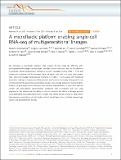| dc.contributor.author | Li, Jennifer W. | |
| dc.contributor.author | Genshaft, Alex S. | |
| dc.contributor.author | de Riba Borrajo, Jacob | |
| dc.contributor.author | Shalek, Alex K. | |
| dc.contributor.author | Kimmerling, Robert John | |
| dc.contributor.author | Kazer, Samuel Weisgurt | |
| dc.contributor.author | Payer, Kristofor Robert | |
| dc.contributor.author | Borrajo, Jacob de Riba | |
| dc.contributor.author | Blainey, Paul C | |
| dc.contributor.author | Irvine, Darrell J | |
| dc.contributor.author | Manalis, Scott R | |
| dc.contributor.author | Szeto, Gregory | |
| dc.contributor.author | Shalek, Alexander K | |
| dc.date.accessioned | 2016-03-17T00:53:22Z | |
| dc.date.available | 2016-03-17T00:53:22Z | |
| dc.date.issued | 2016-01 | |
| dc.date.submitted | 2015-06 | |
| dc.identifier.issn | 2041-1723 | |
| dc.identifier.uri | http://hdl.handle.net/1721.1/101730 | |
| dc.description.abstract | We introduce a microfluidic platform that enables off-chip single-cell RNA-seq after multi-generational lineage tracking under controlled culture conditions. We use this platform to generate whole-transcriptome profiles of primary, activated murine CD8+ T-cell and lymphocytic leukemia cell line lineages. Here we report that both cell types have greater intra- than inter-lineage transcriptional similarity. For CD8+ T-cells, genes with functional annotation relating to lymphocyte differentiation and function—including Granzyme B—are enriched among the genes that demonstrate greater intra-lineage expression level similarity. Analysis of gene expression covariance with matched measurements of time since division reveals cell type-specific transcriptional signatures that correspond with cell cycle progression. We believe that the ability to directly measure the effects of lineage and cell cycle-dependent transcriptional profiles of single cells will be broadly useful to fields where heterogeneous populations of cells display distinct clonal trajectories, including immunology, cancer, and developmental biology. | en_US |
| dc.description.sponsorship | National Institutes of Health (U.S.) (Contract R21AI110787) | en_US |
| dc.description.sponsorship | National Cancer Institute (U.S.). Physical Sciences Oncology Center (U54CA143874) | en_US |
| dc.description.sponsorship | National Cancer Institute (U.S.) (Koch Institute Support (Core) Grant P30-CA14051) | en_US |
| dc.description.sponsorship | National Science Foundation (U.S.). Graduate Research Fellowship | en_US |
| dc.description.sponsorship | National Institutes of Health (U.S.) (Ruth L. Kirschstein National Research Service Award F32CA1800586) | en_US |
| dc.description.sponsorship | Kinship Foundation. Searle Scholars Program | en_US |
| dc.description.sponsorship | Beckman Young Investigator Program | en_US |
| dc.description.sponsorship | National Institutes of Health (U.S.) (New Innovator Award DP2 OD020839) | en_US |
| dc.language.iso | en_US | |
| dc.publisher | Nature Publishing Group | en_US |
| dc.relation.isversionof | http://dx.doi.org/10.1038/ncomms10220 | en_US |
| dc.rights | Creative Commons Attribution | en_US |
| dc.rights.uri | http://creativecommons.org/licenses/by/4.0/ | en_US |
| dc.source | Nature Publishing Group | en_US |
| dc.title | A microfluidic platform enabling single-cell RNA-seq of multigenerational lineages | en_US |
| dc.type | Article | en_US |
| dc.identifier.citation | Kimmerling, Robert J., Gregory Lee Szeto, Jennifer W. Li, Alex S. Genshaft, Samuel W. Kazer, Kristofor R. Payer, Jacob de Riba Borrajo, et al. “A Microfluidic Platform Enabling Single-Cell RNA-Seq of Multigenerational Lineages.” Nat Comms 7 (January 6, 2016): 10220. | en_US |
| dc.contributor.department | Massachusetts Institute of Technology. Institute for Medical Engineering & Science | en_US |
| dc.contributor.department | Harvard University--MIT Division of Health Sciences and Technology | en_US |
| dc.contributor.department | Massachusetts Institute of Technology. Department of Biological Engineering | en_US |
| dc.contributor.department | Massachusetts Institute of Technology. Department of Chemistry | en_US |
| dc.contributor.department | Massachusetts Institute of Technology. Department of Materials Science and Engineering | en_US |
| dc.contributor.department | Massachusetts Institute of Technology. Department of Mechanical Engineering | en_US |
| dc.contributor.department | Massachusetts Institute of Technology. Microsystems Technology Laboratories | en_US |
| dc.contributor.department | Koch Institute for Integrative Cancer Research at MIT | en_US |
| dc.contributor.mitauthor | Kimmerling, Robert John | en_US |
| dc.contributor.mitauthor | Szeto, Gregory Lee | en_US |
| dc.contributor.mitauthor | Li, Jennifer W. | en_US |
| dc.contributor.mitauthor | Genshaft, Alex S. | en_US |
| dc.contributor.mitauthor | Kazer, Samuel Weisgurt | en_US |
| dc.contributor.mitauthor | Payer, Kristofor Robert | en_US |
| dc.contributor.mitauthor | Borrajo, Jacob de Riba | en_US |
| dc.contributor.mitauthor | Blainey, Paul C. | en_US |
| dc.contributor.mitauthor | Irvine, Darrell J. | en_US |
| dc.contributor.mitauthor | Shalek, Alex | en_US |
| dc.contributor.mitauthor | Manalis, Scott R. | en_US |
| dc.relation.journal | Nature Communications | en_US |
| dc.eprint.version | Final published version | en_US |
| dc.type.uri | http://purl.org/eprint/type/JournalArticle | en_US |
| eprint.status | http://purl.org/eprint/status/PeerReviewed | en_US |
| dspace.orderedauthors | Kimmerling, Robert J.; Lee Szeto, Gregory; Li, Jennifer W.; Genshaft, Alex S.; Kazer, Samuel W.; Payer, Kristofor R.; de Riba Borrajo, Jacob; Blainey, Paul C.; Irvine, Darrell J.; Shalek, Alex K.; Manalis, Scott R. | en_US |
| dc.identifier.orcid | https://orcid.org/0000-0002-7380-9594 | |
| dc.identifier.orcid | https://orcid.org/0000-0001-5223-9433 | |
| dc.identifier.orcid | https://orcid.org/0000-0003-3079-5134 | |
| dc.identifier.orcid | https://orcid.org/0000-0001-7604-1333 | |
| dc.identifier.orcid | https://orcid.org/0000-0003-3552-8182 | |
| dc.identifier.orcid | https://orcid.org/0000-0001-7014-3830 | |
| dc.identifier.orcid | https://orcid.org/0000-0001-9939-764X | |
| mit.license | PUBLISHER_CC | en_US |
